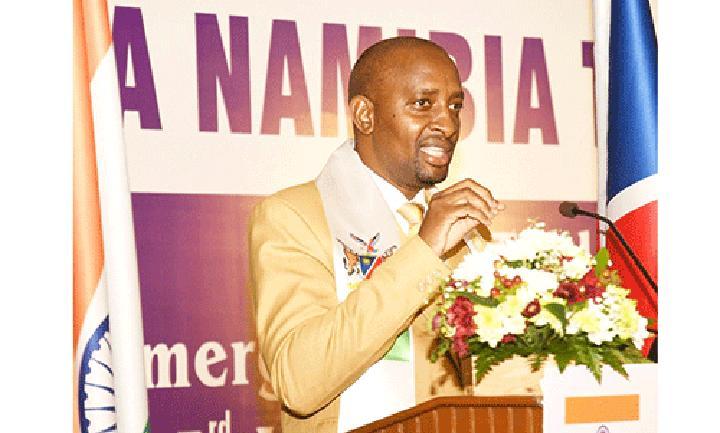Africa-Press – Namibia. Namibia-India relations are marked by deep historical ties, mutual respect and dynamic strategic engagement.
India was among the first countries to champion Namibia’s independence at the United Nations as early as 1946.
It hosted Swapo’s first foreign mission in New Delhi in 1986.
New Era’s journalist Paheja Siririka (PS) engaged Namibia’s High Commissioner to India, Gabriel Sinimbo (GS) in New Delhi.
PS: How would you describe the partnership between the two countries?
GS: The relationship has since grown into a multifaceted partnership, encompassing trade, capacity-building, defence cooperation, education, green energy and people-to-people exchange. Recent milestones include the successful hosting of the inaugural Joint Commission of Cooperation in 2023, the formal opening of the India-Namibia Centre of Excellence in information technology, and cooperation in areas like digital payments and entrepreneurship development. The partnership is underpinned by shared values, democracy, South-South solidarity and multilateralism.
PS: What are the key aspects that define the growing relationship between the two countries? How do they reflect broader goals for South-South cooperation?
GS: Namibia-India relations exemplify a historic friendship and a shared vision for mutual development. With bilateral trade surging, joint efforts in education and technology expanding, and a strong base in diplomacy and energy cooperation, the two countries are poised to lead South-South engagement into the future.
PS: Could you highlight Namibia’s foreign policy priorities in South Asia?
GS: Namibia’s foreign policy in South Asia, particularly through its High Commission in New Delhi, focuses on economic diplomacy, which includes attracting strategic investments in sectors such as mining, green hydrogen, agriculture, pharmaceuticals, and infrastructure. We are heavily invested in capacity development by means of expanding technical and vocational training through the Indian Technical and Economic Cooperation (ITEC) programme as well as the Indian Council for Cultural Relations (ICCR). ITEC is the leading capacity-building platform of the ministry of external affairs, while the ICCR is an autonomous organisation of the Government of India, involved in India’s global cultural relations through cultural exchange with other countries and their people. The foreign policy prioritises multilateral advocacy. This is about advancing common positions on global governance reform, climate change and South-South cooperation. We also have consular outreach, where we are strengthening representation.
PS: How has Namibia benefitted from India’s ITEC and ICCR scholarship programmes?
GS: Namibia is one of the largest African beneficiaries of India’s development training programmes. Over 1 700 Namibians trained under the ITEC, including 1 400 full scholars. ICCR scholarships have enabled studies in engineering, health sciences, management and social studies. Namibian diplomats regularly train at the Sushma Swaraj Institute of Foreign Service (SSIFS), which is India’s premier diplomatic training institute under the ministry of external affairs.
PS: What sectors in Namibia are currently open or seeking Indian investment?
GS: Namibia is actively seeking Indian investment in the mining sector: diamonds, uranium, copper, zinc and rare earth elements remain key. Namibia is the third-largest global exporter of uranium. In the green hydrogen and renewable energy sector, with 300+ days of sunshine annually, Namibia aims to become Africa’s green energy hub. In the oil and gas sector, exploration in the Orange Basin has revealed promising reserves. In agriculture and agro-processing, investment is encouraged in irrigation tech, food processing and seed innovation. In pharmaceuticals and healthcare, Namibia imports Indian generics and is exploring local manufacturing through joint ventures. In terms of information and communication technology (ICT) as well as infrastructure, from broadband expansion to smart transport corridors, Namibia welcomes Indian partnerships.
PS: Talking about ICT and health, how is Namibia leveraging India’s capabilities in those sectors, including renewable energy?
GS: The India-Namibia Centre of Excellence in IT, inaugurated in 2023, is training a new generation of digital professionals. In pharmaceuticals, India remains Namibia’s primary supplier of affordable medicine. Discussions are ongoing for joint pharmaceutical ventures. For renewable energy, India’s experience in solar energy and hydrogen technologies positions it as a vital partner in Namibia’s green hydrogen ambitions. In terms of digital payments, Namibia became the first country to sign a licensing agreement with India’s UPI platform for real-time transactions, with implementation scheduled for 2025.
PS: What challenges do Indian businesses face in Namibia? How is the High Commission addressing them? Do we have Namibian businesses operating in India?
GS: Challenges include regulatory complexities, limited technical expertise and administrative delays. The High Commission acts as a liaison between Indian investors and Namibian ministries, facilitating trade forums and advocating for transparent regulatory processes. While Namibia lacks a large business footprint in India, collaboration in diamonds, tourism and education is growing.
PS: How are trade relations evolving post-Covid and post-AfCFTA?
GS: Trade has rebounded strongly. In the 2023-24 financial year, bilateral trade reached US$813 million, a 192% increase from the previous year. India’s exports to Namibia surged 88% to US$453 million. Post-Covid and within the framework of the African Continental Free Trade Area (AfCFTA), Namibia is positioning itself as a regional logistics hub for Indian goods and technology.
PS: How can Namibia and India cooperate more in areas like agriculture, water management and rural development?
GS: India and Namibia can deepen cooperation in water management: boreholes, desalination and integrated systems. In agriculture: research and development in drought-resistant crops, irrigation and agro-processing. In rural development: digital inclusion, financial services and solar energy models.
For More News And Analysis About Namibia Follow Africa-Press






